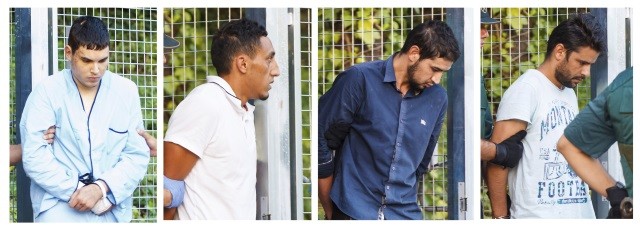The imam who led the Barcelona terror cell was supposed to be expelled from Spain in 2014, but he received clemency.
An Islamic terror cell was preparing bombs for an imam who planned to blow himself up at a Barcelona monument, a key suspect in the attacks that killed 15 people in northeastern Spain told a judge Tuesday, according to a judicial official.
The suspect, Mohamed Houli Chemlal, was one of four men taken before Spain’s National Court in Madrid to testify about the Islamic cell that attacked pedestrians in Barcelona and the nearby seaside town of Cambrils last week.
National Court Judge Fernando Andreu questioned the four about the vehicle attacks as well as the fatal explosion at a bomb-making workshop that police said scuttled the group’s plot to carry out an even more deadly attack at unspecified Barcelona monuments.
A Spanish judicial official said Houli Chemlal, 21, and suspect Driss Oukabir, 28, identified Imam Abdelbaki Es Satty as the ideological leader of the 12-man cell.
Es Satty and another accidently blew themselves up while preparing explosives in a house in the coastal town of Alcanar, south of Barcelona. Police found in the house over 100 tanks of butane gas and materials to make TATP, an explosive frequently used in attacks by Islamic State (ISIS) terrorists.
Es Satty preached at a mosque in the northeastern town of Ripoll, home to most of the 12 pointed to by police as suspected members of the cell. Police identified his remains amid the rubble of the Aug. 16 explosion that destroyed the house in Alcanar.
He was ordered to leave Spain in April 2014 after serving a four-year prison sentence for drugs offences, but was allowed to stay after appealing to a judge, the UK’s Telegraph reported Tuesday. The judge is said to have accepted Es Satty’s claims that an expulsion would be a breach of his international rights. He further sought and was granted asylum, a move that enabled him to move freely among the 26 European Union countries.
The cell’s other eight members are dead. Police shot five during an attack Friday and one more Monday after a manhunt.
The group has claimed responsibility for both attacks on pedestrians — one Thursday by a van that mowed down people on Barcelona’s famed Las Ramblas promenade and another early Friday in Cambrils. The attacks and a bloody getaway in which a man was stabbed to death left 15 dead and over 120 wounded.
Houli Chemlal, the only survivor of the Alcanar blast, told the court Tuesday that he is alive because he was on the ground floor of the house washing dishes after dinner. He testified from a wheelchair without lifting his eyes up from the ground, according to the court official. He has been hospitalized under guard since his arrest Thursday.
The lone fugitive from the initial attack, 22-year-old Younes Abouyaaqoub, was shot to death Monday west of Barcelona after a big, daylong manhunt. Police say he flashed what turned out to be a fake suicide belt at two officers who confronted him in a vineyard.
Abouyaaqoub’s brother and friends made up the rest of the 12-man extremist cell, police say.
Spanish media say the other 11 suspects are all reportedly Moroccans who lived in Spain.
After the session, the judge ordered two of the surviving suspects held without bail, another detained for 72 more hours and one freed with restrictions.
By: AP and World Israel News Staff





